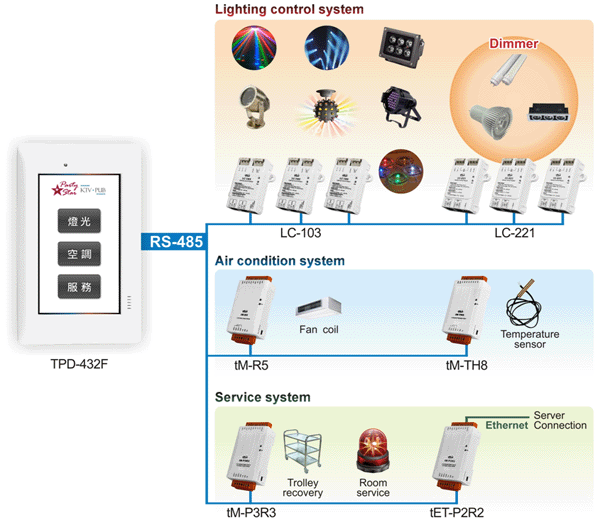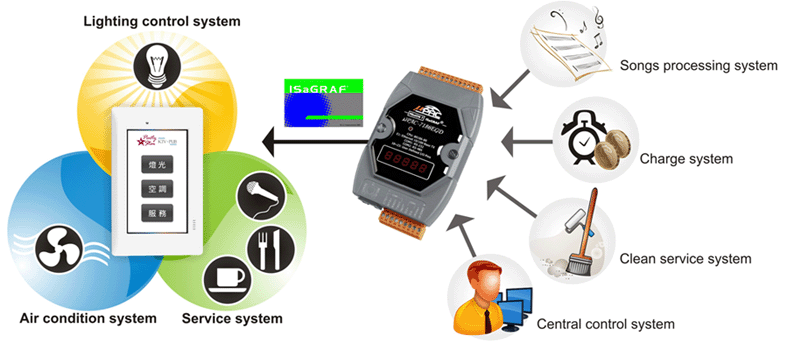Search: Product Update
Lighting & Air Conditioning Service in KTV
Product Update
2014-11-06
Nowadays, KTV has become one of the most popular entertainment places for modern people. In order to win and keep customers, automation control has been introduced to enhance services already provided and create add-on values by providing new services.
System Description
Lighting control and air conditioning are the most important parts for indoor entertainment places, especially for KTV private rooms, lighting control usually plays an important role in creating pleasant atmosphere and air conditioning helps to get rid of odd smells and adjust temperature to makes a comfort environment.Lighting Control System
In the past, when it comes to the design of lighting control system, the designer usually tries to break down the operations into as many details as possible; and the user has to perform a lot of operations to manually adjust and turn on/off multiple switches to achieve desired effect for specific lighting requirement. Nowadays, as the requirements of lighting control is getting even more complicated and people prefer simplified all-in-one-touch operation; a control panel with convenient one-click options to meet various lighting requirements is getting popular.Air Conditioning System
Unlike typical window air conditioners used for general household, the air conditioning systems for large-scale applications such as commercial offices, buildings, shopping malls ... and so on, usually adopt central air-conditioning systems. To adjust air conditioning in a certain region of a central air conditioning system, it usually requires the measurements of temperature sensors and to control the valves in accordingly, therefore, 3 major operations: “Start/Stop the Switches”, “Adjusting the Air Volume” and “Settings of the Target Temperature” are involved. In the past, the operations are done by turning on/off and adjusting the switches to control the air volume to achieve desired temperature; these operations are done by analog regulations; the interface usually is lacking of guiding and the configuration is hard to perform. In recent years, as the advance of the technology, all these tedious operations can be replaced by an integrated control panel with intuitive interfaces for users to easily perform all the tasks.System Architecture
In this system, the architecture is planned by carefully taking all requirements into consideration from an integrated view. The design for communication connections and modules selected are all planned by collected data based on the scale and needs. The communication protocol of this system is implemented by Modbus protocol. For ICP DAS provides a wide range of Modbus modules to select from, it is easy to choose Modbus modules with most appropriate I/O combinations to meet specific requirements based on the control operations and functions of the devices.
Lighting Control
| Mode | Module | Description | Note |
|---|---|---|---|
| Digital Turn ON/OFF | LC-103 | 1-channel AC Digital Input and 3-channel Relay Output | Max. Load Current 5A |
| Analog Dimming Control | LC-221 | 1-channel Analog Output | 0 to 10 V Dimmable Ballasts |
Air Conditioning
| Mode | Module | Description | Note |
|---|---|---|---|
| Valve Control | tM-R5 | 5-channel Relay Output | Max. Load Current 5A |
| Temperature Sensor | tM-TH8 | 8-channel Isolation Thermistor Input | Support Precon ST-A3, Fenwell U, YSI L100, YSI L300, YSI L1000, YSI B2252, YSI B3000, YSI B5000, SI B6000, YSI B10000, YSI H10000, YSI H30000 and User-defined |
Air Conditioning
| Mode | Module | Description | Note |
|---|---|---|---|
| Local Service Options | tM-P3R3 | 3-channel Relay Output and 3-channel Wet Contact | Max. Load Current 5A |
| Remote Service Signal | tET-P2R2 | 2-channel Relay Output and 2-channel Wet Contact | TCP Protocol, Max. Load Current 5A |
System Integration
In this modern world, an independent system without distributed resources is gradually eliminated due to lacking of efficiency and flexibility. Small systems (subsystems) - as the basic parts of “Internet of Things”- feature flexibility, cost-effective and energy-efficient; therefore are getting popular. They can work independently and at the same time, provide interconnectivity communication if required.This KTV system is also implemented based on the subsystem concept, each subsystem such as lighting control system, air conditioning system and service system can function independently and can communicate with each other. Under this distributed architecture, ISaGRAF PAC works as an agent controller for information exchange and for linking actions and communication between newly-added service and the original operations of the KTV system.

A. Song Menu System
The songs stored in the database are classified as 4 modes: "bright", "soft", "romantic" and "dynamic". When a song is played, a signal will be sent to the lighting control system to launch the corresponding lighting control operations.
B. Timing System
The system can perform related operations of time charging of the room. It also can automatically turn on the equipments in the private room just right before the time start to charge. And when the room is idle, the equipments can also be automatically turned off for energy saving.
C. Cleaning Service System
In this KTV, dining carts and plates are used for dining services. When a private room requires cleaning service of the used plates, they can put the dining cart and used plates in a certain zone in the room, by infrared position detection, a message for cleaning service can be automatically sent for immediate notification.
D. Central Control System
The Central Control System requires perceiving full information of the private room status in real time for best arrangements and efficient operations. For the private rooms may be far from the control center, Ethernet is used for communications between the private rooms and the Central Control System.

